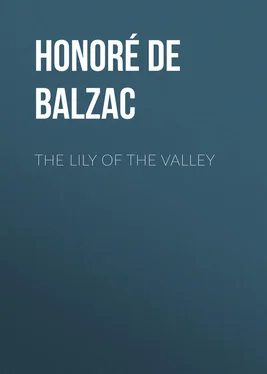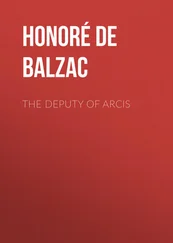Honoré Balzac - The Lily of the Valley
Здесь есть возможность читать онлайн «Honoré Balzac - The Lily of the Valley» — ознакомительный отрывок электронной книги совершенно бесплатно, а после прочтения отрывка купить полную версию. В некоторых случаях можно слушать аудио, скачать через торрент в формате fb2 и присутствует краткое содержание. Жанр: literature_19, foreign_antique, foreign_prose, на английском языке. Описание произведения, (предисловие) а так же отзывы посетителей доступны на портале библиотеки ЛибКат.
- Название:The Lily of the Valley
- Автор:
- Жанр:
- Год:неизвестен
- ISBN:нет данных
- Рейтинг книги:4 / 5. Голосов: 1
-
Избранное:Добавить в избранное
- Отзывы:
-
Ваша оценка:
- 80
- 1
- 2
- 3
- 4
- 5
The Lily of the Valley: краткое содержание, описание и аннотация
Предлагаем к чтению аннотацию, описание, краткое содержание или предисловие (зависит от того, что написал сам автор книги «The Lily of the Valley»). Если вы не нашли необходимую информацию о книге — напишите в комментариях, мы постараемся отыскать её.
The Lily of the Valley — читать онлайн ознакомительный отрывок
Ниже представлен текст книги, разбитый по страницам. Система сохранения места последней прочитанной страницы, позволяет с удобством читать онлайн бесплатно книгу «The Lily of the Valley», без необходимости каждый раз заново искать на чём Вы остановились. Поставьте закладку, и сможете в любой момент перейти на страницу, на которой закончили чтение.
Интервал:
Закладка:
My brother Charles, five years older than I and as handsome a boy as he now is a man, was the favorite of my father, the idol of my mother, and consequently the sovereign of the house. He was robust and well-made, and had a tutor. I, puny and even sickly, was sent at five years of age as day pupil to a school in the town; taken in the morning and brought back at night by my father’s valet. I was sent with a scanty lunch, while my school-fellows brought plenty of good food. This trifling contrast between my privations and their prosperity made me suffer deeply. The famous potted pork prepared at Tours and called “rillettes” and “rillons” was the chief feature of their mid-day meal, between the early breakfast and the parent’s dinner, which was ready when we returned from school. This preparation of meat, much prized by certain gourmands, is seldom seen at Tours on aristocratic tables; if I had ever heard of it before I went to school, I certainly had never had the happiness of seeing that brown mess spread on slices of bread and butter. Nevertheless, my desire for those “rillons” was so great that it grew to be a fixed idea, like the longing of an elegant Parisian duchess for the stews cooked by a porter’s wife, – longings which, being a woman, she found means to satisfy. Children guess each other’s covetousness, just as you are able to read a man’s love, by the look in the eyes; consequently I became an admirable butt for ridicule. My comrades, nearly all belonging to the lower bourgeoisie, would show me their “rillons” and ask if I knew how they were made and where they were sold, and why it was that I never had any. They licked their lips as they talked of them – scraps of pork pressed in their own fat and looking like cooked truffles; they inspected my lunch-basket, and finding nothing better than Olivet cheese or dried fruits, they plagued me with questions: “Is that all you have? have you really nothing else?” – speeches which made me realize the difference between my brother and myself.
This contrast between my own abandonment and the happiness of others nipped the roses of my childhood and blighted my budding youth. The first time that I, mistaking my comrades’ actions for generosity, put forth my hand to take the dainty I had so long coveted and which was now hypocritically held out to me, my tormentor pulled back his slice to the great delight of his comrades who were expecting that result. If noble and distinguished minds are, as we often find them, capable of vanity, can we blame the child who weeps when despised and jeered at? Under such a trial many boys would have turned into gluttons and cringing beggars. I fought to escape my persecutors. The courage of despair made me formidable; but I was hated, and thus had no protection against treachery. One evening as I left school I was struck in the back by a handful of small stones tied in a handkerchief. When the valet, who punished the perpetrator, told this to my mother she exclaimed: “That dreadful child! he will always be a torment to us.”
Finding that I inspired in my schoolmates the same repulsion that was felt for me by my family, I sank into a horrible distrust of myself. A second fall of snow checked the seeds that were germinating in my soul. The boys whom I most liked were notorious scamps; this fact roused my pride and I held aloof. Again I was shut up within myself and had no vent for the feelings with which my heart was full. The master of the school, observing that I was gloomy, disliked by my comrades, and always alone, confirmed the family verdict as to my sulky temper. As soon as I could read and write, my mother transferred me to Pont-le-Voy, a school in charge of Oratorians who took boys of my age into a form called the “class of the Latin steps” where dull lads with torpid brains were apt to linger.
There I remained eight years without seeing my family; living the life of a pariah, – partly for the following reason. I received but three francs a month pocket-money, a sum barely sufficient to buy the pens, ink, paper, knives, and rules which we were forced to supply ourselves. Unable to buy stilts or skipping-ropes, or any of the things that were used in the playground, I was driven out of the games; to gain admission on suffrage I should have had to toady the rich and flatter the strong of my division. My heart rose against either of these meannesses, which, however, most children readily employ. I lived under a tree, lost in dejected thought, or reading the books distributed to us monthly by the librarian. How many griefs were in the shadow of that solitude; what genuine anguish filled my neglected life! Imagine what my sore heart felt when, at the first distribution of prizes, – of which I obtained the two most valued, namely, for theme and for translation, – neither my father nor my mother was present in the theatre when I came forward to receive the awards amid general acclamations, although the building was filled with the relatives of all my comrades. Instead of kissing the distributor, according to custom, I burst into tears and threw myself on his breast. That night I burned my crowns in the stove. The parents of the other boys were in town for a whole week preceding the distribution of the prizes, and my comrades departed joyfully the next day; while I, whose father and mother were only a few miles distant, remained at the school with the “outremers,” – a name given to scholars whose families were in the colonies or in foreign countries.
You will notice throughout how my unhappiness increased in proportion as the social spheres on which I entered widened. God knows what efforts I made to weaken the decree which condemned me to live within myself! What hopes, long cherished with eagerness of soul, were doomed to perish in a day! To persuade my parents to come and see me, I wrote them letters full of feeling, too emphatically worded, it may be; but surely such letters ought not to have drawn upon me my mother’s reprimand, coupled with ironical reproaches for my style. Not discouraged even then, I implored the help of my sisters, to whom I always wrote on their birthdays and fete-days with the persistence of a neglected child; but it was all in vain. As the day for the distribution of prizes approached I redoubled my entreaties, and told of my expected triumphs. Misled by my parents’ silence, I expected them with a beating heart. I told my schoolfellows they were coming; and then, when the old porter’s step sounded in the corridors as he called my happy comrades one by one to receive their friends, I was sick with expectation. Never did that old man call my name!
One day, when I accused myself to my confessor of having cursed my life, he pointed to the skies, where grew, he said, the promised palm for the “Beati qui lugent” of the Saviour. From the period of my first communion I flung myself into the mysterious depths of prayer, attracted to religious ideas whose moral fairyland so fascinates young spirits. Burning with ardent faith, I prayed to God to renew in my behalf the miracles I had read of in martyrology. At five years of age I fled to my star; at twelve I took refuge in the sanctuary. My ecstasy brought dreams unspeakable, which fed my imagination, fostered my susceptibilities, and strengthened my thinking powers. I have often attributed those sublime visions to the guardian angel charged with moulding my spirit to its divine destiny; they endowed my soul with the faculty of seeing the inner soul of things; they prepared my heart for the magic craft which makes a man a poet when the fatal power is his to compare what he feels within him with reality, – the great things aimed for with the small things gained. Those visions wrote upon my brain a book in which I read that which I must voice; they laid upon my lips the coal of utterance.
My father having conceived some doubts as to the tendency of the Oratorian teachings, took me from Pont-le-Voy, and sent me to Paris to an institution in the Marais. I was then fifteen. When examined as to my capacity, I, who was in the rhetoric class at Pont-le-Voy, was pronounced worthy of the third class. The sufferings I had endured in my family and in school were continued under another form during my stay at the Lepitre Academy. My father gave me no money; I was to be fed, clothed, and stuffed with Latin and Greek, for a sum agreed on. During my school life I came in contact with over a thousand comrades; but I never met with such an instance of neglect and indifference as mine. Monsieur Lepitre, who was fanatically attached to the Bourbons, had had relations with my father at the time when all devoted royalists were endeavoring to bring about the escape of Marie Antoinette from the Temple. They had lately renewed acquaintance; and Monsieur Lepitre thought himself obliged to repair my father’s oversight, and to give me a small sum monthly. But not being authorized to do so, the amount was small indeed.
Читать дальшеИнтервал:
Закладка:
Похожие книги на «The Lily of the Valley»
Представляем Вашему вниманию похожие книги на «The Lily of the Valley» списком для выбора. Мы отобрали схожую по названию и смыслу литературу в надежде предоставить читателям больше вариантов отыскать новые, интересные, ещё непрочитанные произведения.
Обсуждение, отзывы о книге «The Lily of the Valley» и просто собственные мнения читателей. Оставьте ваши комментарии, напишите, что Вы думаете о произведении, его смысле или главных героях. Укажите что конкретно понравилось, а что нет, и почему Вы так считаете.












